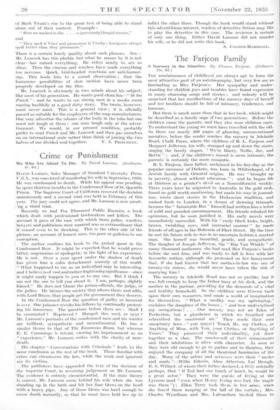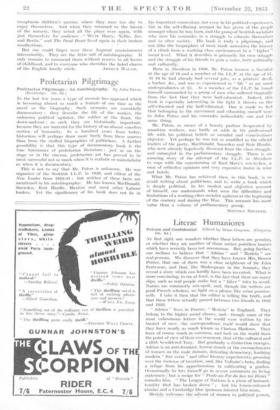The Farj eon Family
A Nursery in the Nineties. By Eleanor Farjeon. (Gollanez. 10s. 6d. ) THE reminiscences of childhood are always apt to form the most attractive part of an autobiography, but very few are as fascinating as Miss Farjeon's. Her sympathy and under- standing for childish joys and troubles have found expression in many charming songs and stories ; and nobody will be surprised that her recollections of the nursery days of herself and her brothers should be full of intimacy, tenderness, and humour.
But there is much more than that in her book, which might be described as a family saga of two generations. Before the children came the parents, and they also were children once. To understand the young we must have travelled with the old. So there are nearly 200 pages of glancing, unconventional narrative, before the reader reaches the nursery in Adelaide Road, Chalk Farm, where the children of B. L. Farjeon and Margaret Jefferson, his wife, stamped up and down the stairs, singing the family slogan, " We're Harry, Nellie, Joe, and Bertie " ; and, if the children's record is more intimate, the parents' is certainly the more romantic.
B.' L. Farjeon, their father, acclaimed in his hey-day as the popular successor of Dickens, was born in Whitechapel, of a Jewish family with Oriental origins. He was " brought up in poverty, almost without education " ; and he began life at thirteen as a printer's devil on a Nonconformist weekly. Three years later he migrated to Australia in the gold rush, found no gold worth mentioning, but made his way in journal- ism, wrote short stories in the Dickensian tradition, and rushed back to London, in a dream of dawning triumph, because the " Inimitable Boz " himself had written him a letter of mild and guarded encouragement. His friends rebuked his optimism, but he soon justified it. His early novels were immediately successful. With his " curly black locks, bright, brown, ,twinkling eyes, and mercurial manner " . he made friends of all ages in the Bohemia of Fleet Street. By the time he met his future wife he was in no uncertain fashion a marked man: She herself was beautiful; gentle, and sympathetic. The daugher of Joseph Jefferson, the " Rip Van Winkle " of many thousand audiences, she had read Ben Farjeon's books before she met him, and was ready to fall in love with her favourite author, although she protested on her honeymoon that, if she had known that her mother-in-law was one of twenty-six sisters, she would never have taken the risk of marrying him I The nursery in Adelaide Road was not so prolific, but it was fell enough to keep the father busy at his desk, and the mother in the parlour, providing for the demands of a vital and healthy household. So the children were thrown back upon their own resources, and made a world of imagination for themseives. " What a medley was my upbringing," exclaims the daughter of the house ; " and how undisciplined my occupations I . . Our nursery was not an Eden of Perfection, but a glasshouse in which we breathed and rebreathed the emotional air." They made their own sumptuary laws—" you mayn't Touch Me, my Clothes, or Anything of Mine, with You, your Clothes, or Anything of Yours." They preserved their individuality, yet drew together as a clan. The muster-roll of their amusements and their inhibitions is alive with character. As soon as they were old enough to go to parties and to theatres, they enjoyed the company of all the theatrical lumiharies of the day. Many of the actors and actresses were their " uncles
and aunts Edouin, Alice Atherton, Lai Brough, E. S. Willard, of whom their father declared, a little unkindly perhaps, that " if Ted had one touch of heart, he would be a great actor." They were the guests of Iri.ing at the Lyceum (and " even when Henry Irving was bad, the magic was there ")-; Ellen Terry took them in her arms, when she found them weeping at the fall of the curtain Mrs. Charles Wyndham and Mrs. I abouchere invited them to sumptuous children's parties, where they were too shy to enjoy themselves. And when they returned' to the haven of the nursery, they acted all the plays over again, with just themselves for audience—" We're Harry, Nellie, Joe, and Bertie," and The Dead Heart lived again in their broken recollections.
But one could linger over these fragrant reminiscences interminably. They are the Attic salt of autobiography. It only remains to commend them without reserve to all lovers of childhood, and to everyone who cherishes the faded charm































































































 Previous page
Previous page